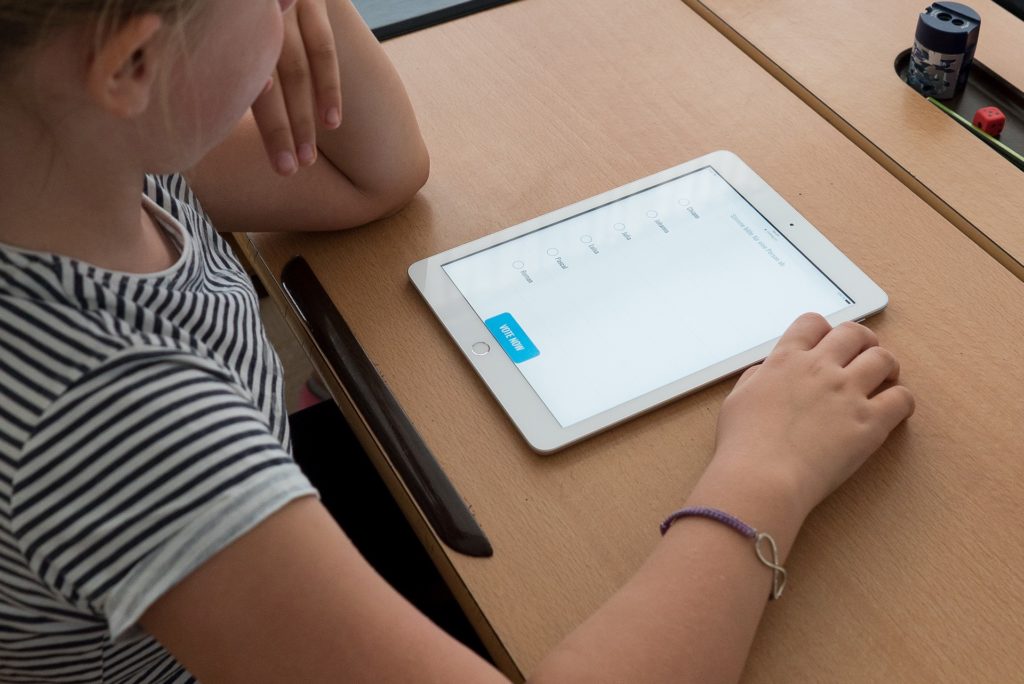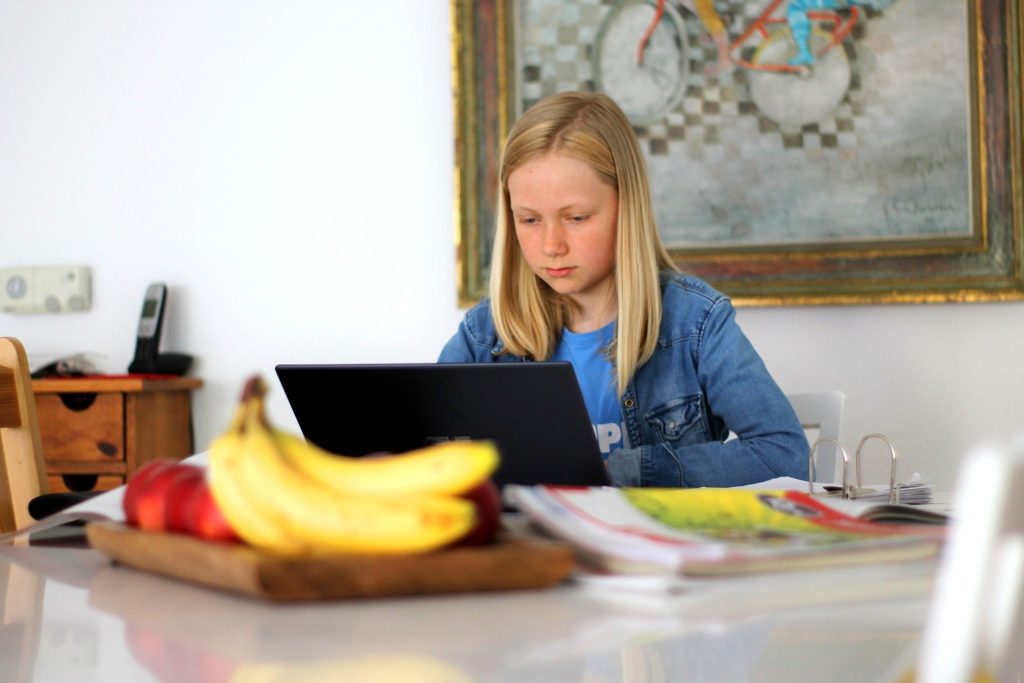When the World of Children and Teenagers Goes Online
By Lauren Busfield, DSW, LCSW
Suddenly, for many people, the fact that our lives can exist mostly online has become a reality that we were not ready to face. Due to the current world pandemic, calls for and mandates of social distancing measures, closure of schools, businesses, and gathering places, and the switch to a “now virtual” format for things we never considered attending online before have all led to a different relationship with the technology in our lives. These last few months have highlighted the ways that technology can protect us while allowing us to live our lives, rather than the formerly mainstream narrative of protecting ourselves from too much technology. This highlight is possibly the most obvious in our work with children.

This rapid shift, brought about by circumstances for which our society was unprepared, switched the dialogue from the dangers of technology, particularly for children and teens, to the positives of technology use. This shift has left some parents and children spinning from the change, and social workers needing to dip into tools that they had not previously considered or used, in order to help children and families thrive in this new reality.
Switching Sides: Technology is Good
The warnings parents have been receiving for years from health organizations such as the American Academy of Pediatrics (AAP) stress the need for serious limitations regarding screen time, recommending no more than one hour a day for children over the age of 2 years.1 However, when schools, sports, and social groups suddenly sit down, concerns about the amount of screen exposure were suddenly put on the back burner. The narrative from child development experts has switched to helping children find ways to connect with others to avoid isolation, and finding educational and social opportunities online. Instead of a focus on the health benefits of limited online time, this change represents a shift in our priorities and perspectives; education and connection have become more important than the possible health benefits of restricting online time.

As increased screen time became a necessity, many families discovered what their children have been expressing for years—it may not be ideal for everyone, but online life is not too bad; in fact, it can be good. They have friends they can talk to. They can learn a lot from watching videos. They can participate in school and receive an education. They can benefit from an augmented reality. They can laugh, and share, and play, and grow. Most importantly, because they are the generation of ”digital natives,” they can adapt.
Whose Challenges Matter More?

Throughout this time, both media and social media attention has leaned toward the difficulties experienced by adults; the challenges of working from home, lack of work, boredom, social isolation, excessive alcohol consumption, and the difficulties of ”home-schooling” children. However, less focus has been placed on how children and adolescents are dealing with the ways their lives have been changed since going online; sometimes, when these challenges are mentioned, they are minimized. For instance, it “isn’t too hard” to stay home on the couch, or missing out on going to the prom and other social milestones is insignificant compared with the hardships and difficulties faced by previous teenage generations, including in some cases the reality of going to war. But this downplays the upheaval currently experienced by most children and teens when, not only have their school lives disappeared, but their home lives and family dynamics have also changed drastically, and their social circles have become limited or eliminated entirely. The experiences that children and teens have faced during this time are uniquely their own.

For those of us working with families and children, it is important that we acknowledge the challenges all members of the family might be facing. While parents may be struggling with balancing their roles as essential workers, or working from home with sudden full-time child-minding, schooling, and household responsibilities, the children that they care for may be struggling in different ways. A practitioner working with a family may need to address parental burnout, but not while ignoring the challenges the children in the family may be experiencing as well. Giving voice to the experiences of the younger generation can help the family move toward solutions together. We in social work know that success is more likely if we engage the entire family when working toward effective change; our first step needs to be acknowledging the problems faced by all family members, including the children.
Collective Trauma
People of all generations are no strangers to the experience of collective trauma. We often define our generational groups based on shared experiences; often, those experiences are traumatic. War, terrorism, memorable deaths, and other tragedies all become part of the collective consciousness that helps us relate to others in our generation. While the slow shutdown of society and the impacts of the pandemic may not have the same immediate or dramatic effect as violence, the traumatic impact of a world that may be forever changed remains powerful, and those who are children right now may be the most impacted.
As our brains develop, how we view and experience the world is shaped; events that interfere with our perception that the world is overall a safe, good place will have consequences that last into, and may shape, adulthood. Some theorize that our perception of time changes as we age; time seems to pass more quickly the older we are. Thus, the younger we are, the effects of these changes in our society represent not only a larger percentage of our life but also, the longer these disruptions last the more it may feel like normal life will never resume. Social workers working with children actively experiencing the effects of this collective trauma and sense of loss need to be cognizant, not only of lasting impacts but also symptoms of behavioral or emotional distress. This includes the experience of loss and a lack of security experienced by children who may feel they are missing important experiences in their lives. Exposure to trauma can result in an array of symptoms. In children, we might see behavioral or psychological symptoms, including lack of concentration, depression, anxiety, eating or sleeping disorders, or physical symptoms—or any combination of these.
Moving Forward
While we do need to be aware that our clients right now and in the future are coping with experiences unique to their generation, we can also begin preparing for the future by adding to our toolboxes, including a focus on the strengths that can be gained from the online world. Social workers can start by asking questions that focus on more than just time spent online and instead work to understand and help guide the child’s experience: How do you use your online time? What are your relationships like with friends? Do you feel drained or refreshed when you’ve spent time on the computer? How can you use this time mindfully, taking breaks and engaging in other activities when you need them?

One focus with families can be on the strengths and resilience of the children forced to adapt to new situations. Social connections may move in a new direction, fueled by young people who know how to find, organize, connect with, and in some cases, mobilize like-minded people. Creativity can be nurtured and blossom online, through the creation and sharing of videos, art, pictures, stories, and ideas. New connections can be formed, education supplemented or enhanced, and accessibility to opportunities expanded. Our youth can find their voices online, and if we listen, we might learn a lot from this adaptable, expressive, social, and digital generation.
- Council on Communications and Media. (2016, November). Media and young minds. Pediatrics, 138(5), 1-6.

Lauren Busfield, DSW, LCSW
Lauren received her Master’s in Social Work from West Chester University of Pennsylvania and her Doctorate in Clinical Social Work from Rutgers University. She serves as the Director of Field Education for Saint Elizabeth University, where she oversees the clinical portion of the BSW program. Lauren retains a clinical practice, working both in private practice and the non-profit sector with adolescents, children, and families. Her research and publications have focused on ways technology impacts the culture of young people, mental health, family relationships, trauma, and development. She runs a resource and research site for parents and mental health professionals raising & working with children who are growing up in a digital world. https://growingupdigital.org

